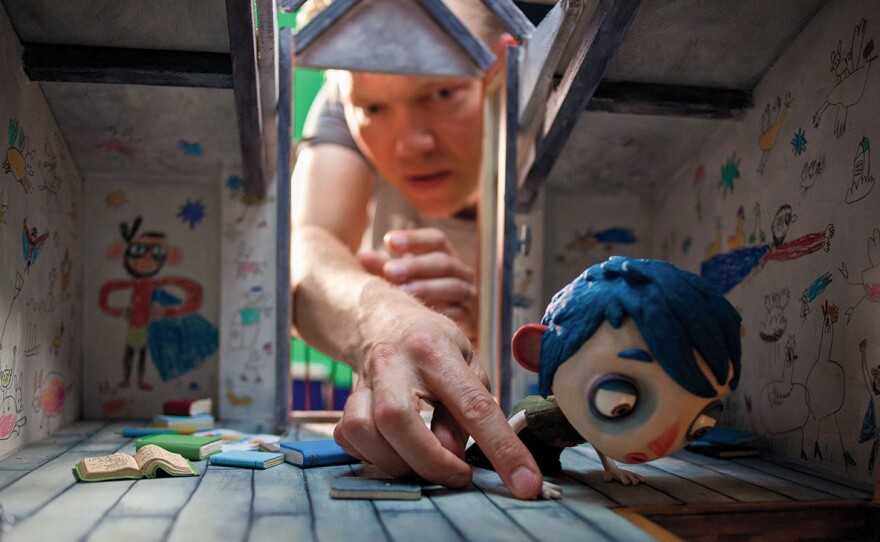The French-Swiss co-production “My Life as a Zucchini” (opening March 3 at Landmark’s Ken Cinema) was nominated for Best Animated Film at this year’s Academy Awards. It’s a far more complex and rewarding film than “Zootopia,” the film that took home the Oscar gold on Sunday.
You don’t expect issues of abuse, abandonment and childhood tragedy to be the subject of animated fare. Even less expected is to find those topics approached with delicacy, sensitivity and aching accuracy. But “My Life as a Zucchini” is all those things and more.
It begins with a young lad, Icare, who prefers the nickname Zucchini, who accidentally kills his mom while trying to avoid her drunken rage. A police officer named Raymond tries to discover the details of the case and takes the young boy to a home where other orphans of children without a family are placed.
One of the children at the home had her mother deported; another was sexually abused by her father; and the latest arrival, Camille, saw her father kill her mother. Not the kind of feel-good back-stories you find in most American animation.
In fact, “Zootopia’s” Oscar win is just further proof of how the American film industry prefers to relegate animation to the kiddie’s table. The animated Disney film may have state of the art animation, but it’s sense of storytelling and theme is decidedly juvenile.
That’s not to say adults can’t enjoy it but it's the type of film that makes its theme clear from the opening moments and then misses no opportunity to hammer the theme home, being careful to tell you exactly how to think and feel once the film is over.
There’s nothing wrong with animation aimed at kids, but in America that is the expectation. That’s a big contrast to Japan and to a lesser extent Europe, where animation is a stylistic choice like deciding to shoot in black and white or on film stock.
Animation aimed at adults or that tackles mature themes is rare for American mainstream studios. The exception that proves the rule is “South Park,” and “My Life as a Zucchini” shares one thing with that American TV show. Both use somewhat crude looking animation, something that maybe a child could design to tell surprisingly clever stories.
In the case of “South Park”, the cleverness comes in the shape of biting social commentary and raunchy humor. For “My Life as a Zucchini,” the visual style helps to convey a young child’s point of view in order to best talk about painful emotional realities.
The film is based on a young adult book by Gilles Paris and was adapted to the screen by Céline Sciamma, who has provided a fresh voice for young people in films such as “Tomboy” and “Girlhood.” Director Claude Barras uses a young voice cast to bring these children to vivid life. If you close your eyes and listen to the characters talking, they sound like real kids and that engages us in an intimate and effective way.

The film employs a Tim Burton-like claymation style to give us pint-sized characters with oversized heads, big sad eyes and stories that break our heart. Zucchini has blue hair with matching blue shadows around his eyes; red ears that pop out along with a red nose; and a mouth that looks like hand-rolled Play-Doh. So not very realistic, yet he proves to be an expressive little character, more real in many respects than most live-action actors in mainstream Hollywood films.
Barras has a great eye for detail in his storytelling. When Raymond takes Zucchini to the home, the boy is sad so the cop tells him to fly his kite out the car window, and then Raymond turns on the sirens and lets the kite soar.
When the children take a field trip to the mountains to play in the snow, it's not a winter wonderland that catches their eye but rather just a mom wiping the tears away from her injured son's eyes. That scene is heartbreakingly poignant. Barras also gives us subtle insights into the characters in passing details. When Zucchini and Camille go to the fair, Zucchini has a dismal showing at the shooting gallery but Camille grabs the gun and proves to be an ace. The initial joy we feel at her success is tinged with sadness by the fact we know her dad shot her mom and she says it was her dad who taught her to shoot.
Barras’ direction keeps the film from being neither sentimental nor heavy-handed as it weaves an exquisite, compassionate tale about overcoming tragedy to find a new sense of family. In terms of the artistry, emotion and rich storytelling, it reminds me of a stop-motion animation that played at the San Diego Jewish Film Festival, "Mary and Max."
“My Life as a Zucchini” is in French with English subtitles (an English dubbed version is in the works with Will Forte, Nick Offerman, Ellen Page and Amy Sedaris) and is rated PG-13 for thematic elements and suggestive material.






